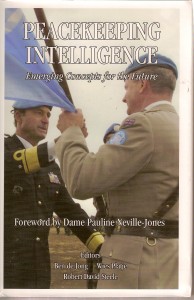
Chapter 13: “Information Peacekeeping & the Future of Intelligence: The United Nations, Smart Mobs, and the Seven Tribes” pp. 201-225
Divided into three parts, the book first addresses the Global Security Environment (2 chapters), then discusses elements of a grand or total strategy (5 chapters), and concludes with a prescription (2 chapters). Every chapter is good.
Chapter 1 by Richard Millet does an outstanding job of discussing the global security environment in terms that make it crystal clear that the highest probability threats are non-traditional threats, generally involving non-state actors in a failed state environment. These are not threats that can be addressed by a heavy metal military that is not trained, equipped, nor organized for humanitarian or constabulary operations. Among his most trenchant observations: America can not succeed when the local elites (e.g. Colombia) are not willing to pay the price for internal justice and stability; sometimes the costs of success can exceed the costs of failure (Afghanistan?); what America lacks today is any criteria by which to determine when to attempt coalition building and when to go it alone; the real threat is not any single government or non-state organization, but the millions of daily decisions (e.g. to buy cocaine or smuggle medicine) that incentivise crime and endless conflict.
Chapter 2 by Robert Dorff dissects existing U.S. national security “strategy” and shows clearly, in a non-partisan manner, that the U.S. does not have a coherent inter-agency capability for agreeing on ends, ways, or means. He calls what we have now–both from the past under Clinton and in the present under Bush, “adhocery” and he makes the compelling point that our failure to have a coherent forward-looking strategy is costing the U.S. taxpayer both money and results.
Chapters 3-7 are each little gems. In Chapter 3 Max Manwaring suggests that our existing assumptions about geopolitics and military power are obsolete, and we are in great danger if Americans cannot change their way of thinking about national security issues. He suggests five remedies, the most important of which is the establishment of a coherent inter-agency planning and operational control process for leveraging all sources of national power–political, diplomatic, economic, military, and informational–simultaneously and in balance. In Chapter 4 Edwin Corr and Max Manwaring offer a fine discourse on why legitimate governance around the world must be “the” end that we seek as a means of assuring American security and prosperity in the face of globalization. Chapter 5 by Leif Rosenberger addresses the economic threats inherent in globalization, including free flows of capital, concluding that fixed exchange rates divorce countries from reality, and that the US must sponsor a global early warning system dedicated to the financial arena. Chapter 5 by Dennis Rempe is good but too short. He clearly identifies information power as being the equal of diplomacy, economics, and military power, going so far as to suggest an “International Information Agency” that could eventually become a public good as well as an objective arbiter of “ground truth.” I like this idea, in part because it is consistent with the ideas I set forth in NEW CRAFT, to wit that we need to migrate from secret intelligence intended for Presidents (who then manipulate that intelligence and lie to their people) toward public intelligence that can be discussed and understood by the people–this makes for sounder decisions. Chapter 7, again by Edwin Corr and Max Manwaring, discusses deterrence in terms of culture, motive, and effect–they are especially good in pointing out that traditional deterrence is irrelevant with suicidal martyrs, and that the best deterrence consists of the education of domestic publics about the realities of the post-Cold War world.
The book concludes with 2 chapters, the first by Edwin Corr and Max Manwaring, who discuss how values (education, income, civic virtue) must be the foundation of the American security strategy. They then translate this into some specific “objectives” for overseas investments and influences by the U.S., and they conclude that the ultimate investment must be in better educating both domestic and international audiences. They recommend the legitimacy of all governments as a global objective; End-State Planning (ESP) as the way to get there; and a new focus on holistic and long-term programs rather than “adhocery” as the best way to manage scarce means. One can only speculate how differently Afghanistan and Iraq (and Haiti, now discarded for a decade) might have turned out if the US had rolled in with a Marshall Plan or Berlin Airlift equivalent the minute organized hostilities ceased. Robert Dorff closes the book by pointing out that state failure is not the root cause, but rather the symptom, and that the U.S. must intervene before a state fails, not after.
I recommend this book, together with Colin Gray's “Modern Strategy” as essential reading for any national security professional. The publishers should consider issuing a more affordable paperback (books cost a penny a page to produce, perhaps a penny a page to market, so anything over $5 on this book is pure profit). This is a book, like Harry Summers on strategy, that should be available for $15 in paperback–if it were, I would buy 200 for my next conference.

The author excells at pointing out, in the most gracious way possible, how all of the preconceptions of the current administration, and in particular its penchant for unilateralist military bullying, have proven both unworkable in achieving their intended results, while also unsuitable in being translated to economic gains. Military power does not translate into economic power or added prosperity.
This book is *loaded* with common sense and specific ideas for getting business leadership back into the global stabilization dialog. The author focused on two ideas that I consider to be especially important: the need to reexamine how the taxpayer dollar is being spent on national security, with a view to redirecting funds (I add: from military heavy metal to what Joe Nye calls soft power: diplomacy, assistance, intelligence); and on the urgency of restoring the independence and expanding the mandate of the U.S. Information Agency so as to overcome the acute misperceptions of the US fostered by Saudi-funded schools for youths being taught to hate, and little else.
The non-governmental organizations come in for special scrutiny, and the author has many good ideas, not only for promoting better business-NGO partnerships, but for auditing the NGOs and not ceding to them the moral high ground. As he points out, many organizations that oppose globalization or specific business practices do not have any standards or transparency with respect to who funds them, how decisions are made, and so on.
Finally, the author concludes with a focus on business education. While citing many improvements made by many schools, he notes that a comprehensive study and reengineering overall has not occurred since the late 1950's and early 1960's, and that the time is long past when graduate business education must be completely revamped. He is exceptionally astute and credible throughout the book as he explores the many things that CEOs need to know but do not receive training on, to include understanding and dealing with government, NGOs, citizen advocates, and the real world. As he notes, Master's in Business Administration tend to train students for the first years in the corporation, not the long-haul. He places some emphasis on the need to consider continuing education as an extension of the original program, and I immediately thought of an MBA as a limited-term license that must be renewed by recurring personal investments in education.
As someone whose opening lecture line to citizens and businessmen is “if the State fails, you fail,” I found this book extraordinarily valuable and urgent. We get the government we deserve. If citizens do not vote, if businessmen do not think of the larger social goods and social contexts within which they operate, then the government will prove incapable and at some point the party will be over.
Yale has always had an extra helping of morality and humanity; in this book the dean of the business school ably makes the case that business leadership and engagement in national security and global stabilization is the sine qua non for continued prosperity. He's got my vote–if I were a mature student looking for a place to learn, he's put Yale right at the top of my list.

His book is effective in making the point, but very candidly, did not go the full distance that I was hoping for–he is, in a word, too general and the book lacks a single chapter that pulls it all together with very specific rankings of both the variables and the countries.
The general proposition is clear-cut: environmental scarcity has social effects that lead to violent conflict. However, the author takes a side road in exploring “human ingenuity” as an ameliorating factor, and while he makes reference to crass corporate and elitist carpet-bagging and the social structures of repression, he fails to draw out more fully and explicitly the inherent association between repressive corrupt regimes with extreme concentrations of wealth and power, scarcity, and violence.
For myself, I found two gems within this book: the first, a passing comment on the crucial role that unfettered urbanization plays in exacerbating scarcity and all that comes with it (migration, disease, crime); the second, the author's prescriptive emphasis, extremely importance, on the prevention of scarcity rather than adaptation or amelioration of scarcity.
The endnotes would have been more useful as footnotes but are quite good. The bibliography and index are four star rather than five star, and I was quite disappointed to not have a single page about the author, nor a consolidated bibliography of his many signal contribution over time in the form of articles and lectures.

Her reasoned and logical discussion of basic premises (sustainability, democractic control, egalitarianism), of key issues in the relations between workers and their corporate employers, of how to achieve environmental as well as social balance, and of the larger global issues including needed changes in federal law, provide the single best primer I have ever seen for anyone–at any level of understanding–who wishes to invest time in understanding what needs to be done to protect future generations who have no one to represent them other than the people.


4.0 out of 5 stars On Target but Fragmented–Needs New Edition with Summary
June 2, 2001
Carolyn Raffensperger (Editor), Joel Tickner (Editor), Wes Jackson (Foreword)
This is the second best of several books on environmental policy I have reviewed, and it merits careful scrutiny in part because it brings together a number of expert authors and there is in essence “something for everyone” in this edited work. What is lacks, though, is a good summary chapter that lists how the “precautionary principle” should be applied across each of the top ten environmental areas of concern–something that could circulate more easily than the book, and perhaps have a beneficial policy impact at the local, state, and national levels–and I suggest this because the meat of the book is good, it needs an executive summary.
The chapter that was most meaningful to me, the one that I think needs to be migrated into business education, international affairs education, science & technology policy education, is by Gordon K. Durnil, Chapter 16, and it deal with “How Much Information Do We Need Before Exercising Precaution.” This is a brilliant piece of work that dissects our current environmental policy information collection, processing, and analysis system, and finds it very deceptive, disingenuous, and consequently seriously flawed.
For the best on the environment, read Pandora's Poison. For the best on public health, read Betrayal of Trust. For a very fine cross-over book that has good chapters from various good people, this is the book to buy and enjoy.
